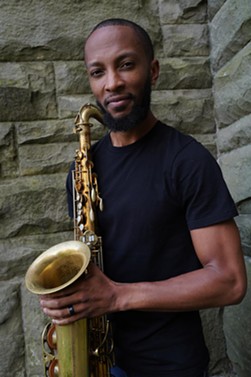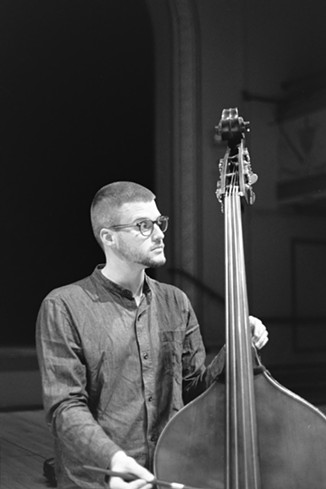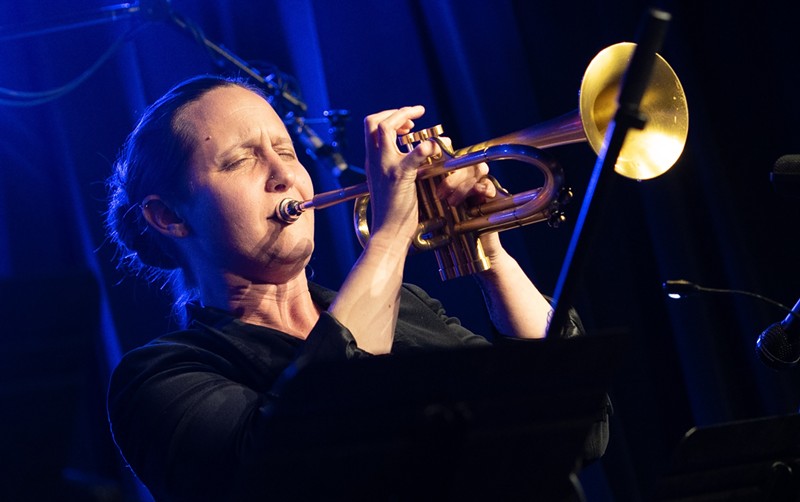Multifaceted artist Evan Haywood has just debuted Professional Love, and while the album’s release date is April 1, with its first track titled “April Fools,” the talent displayed on the project is no joke. The eight-track LP fuses funk, soul, and jazz, embodying a nostalgic era of creativity and camaraderie among Detroit musicians.
Professional Love was mostly recorded in 2013 in Haywood’s first studio “The Lands,” located in the basement of a large Ann Arbor home nicknamed “Le Dog House.” The spot served as an incubator of creativity for young musicians, merging Ann Arbor’s experimental music scene with Detroit jazz and funk. Much of the talent that spent time in the space and is featured on the album has grown to be some of the city’s hottest contemporary jazz musicians including Marcus Elliot, Michael Malis, Ahya Simone, Ian Finkelstein, Josef Deas, and Ingrid Racine, among others.
Over a decade later, these artists have continued to grow together and separately in their music careers, now taking time to reflect on a past period of growth and creative collaboration.
“I think the real story is how a bunch of broke young musicians in Ann Arbor were able to manifest and progress so many styles of music which have historical origins in Detroit, from psychedelic soul and funk to free jazz to hip hop… all using a ramshackle DIY studio,” Haywood says. “The Le Dog House was a place of much chaos and debauchery, but also a sacred space where great art was created amongst a circle of very well-informed and music-obsessed individuals, all pursuing their own forms of greatness.”
Detroit saxophonist Marcus Elliot met Haywood at the Le Dog house around 2010 and has since led a successful career in jazz music including, but certainly not limited to, directing the Creative Arts Orchestra at the University of Michigan, leading bands, and releasing numerous projects.
“That house was filled with some very extremely creative people and Evan was one of them. I wasn’t sure what he was exactly. A musician, rapper, recording engineer, DJ, film enthusiast, visual artist??? Come to find out he was all of these things, but even more so, he was a good friend,” Elliot said in a statement. “It is great to hear these recordings and it is great that Evan captured such a special time in our lives.”
Some musicians who lived in the house, including Michael Malis and Ben Rolston, describe the time and place as a “creative wonderland” for everyone involved.
“A huge gift Le Dog gave to me, and to others I’m sure, was a way to deepen and strengthen musical connections and the personal relationships framing those connections. As a student in jazz school, most of my relationships were through that specific musical lens,” Rolston says. “I felt able to actualize other musical interests and break out of the relatively narrow lane jazz education provides. My musical life after leaving Le Dog has included a wide variety of genres (hip-hop, folk, bluegrass, Balkan, New Orleans funk, etc.) and it’s interesting to reflect back on Le Dog being a large catalyst for following through on such wide-ranging interests.”
“Within a couple weeks of arriving at University of Michigan, I found myself rehearsing at Le Dog with musicians that would become lifelong inspirations and collaborators,” another jazz musician James Cornelison adds. “I learned so much from my older peers in that basement.”
While many musical spaces can be intimidating, The Lands served as a place for young talent to explore their artistry with an intimate, non-judgemental crowd. Ingrid Racine, who is also a U-M jazz alumnus, says that hearing the music from this period was “a joyful surprise and a dose of nostalgia.”
“These recordings are definitely the product of a synergetic time in Ann Arbor, and the Le Dog house was a hub of music-making and community building,” she says. “A good reminder that big rental houses full of young musicians are vital to local music scenes.”
The Le Dog House was always active, a place where the creation of music was happening every single day for years, with a revolving door of unique musicians.
Unfortunately, the good energy of the space eventually turned bad.
“Everybody there was kind of on the same wavelength, and at the same time, the house itself was always in a state of chaos,” Haywood says. “There was always some craziness going on there. It was never the most stable environment. There were always people coming and going.”
Nevertheless, “it was magical,” he adds.
The home was “majestic” in style and vibe, with ornate architecture, regular jam sessions, and spiritual energy, but eventually began to crumble as dangerous people started frequently visiting, leading to dangerous situations. While the instability “allowed the creativity to flow so freely,” Haywood says, there came a time when everyone had to move out for their own safety and sanity.
“That was the nature of the house… a deep sense of fellowship, comfort, and belonging, paired with a foreboding and unshakeable feeling of chaos, dread, danger, and unease. Beauty and ugliness, all coexisting together, trying to make a way,” Haywood says. “This album, Professional Love, is a testament to this struggle and resilience, which I believe is a character of Michigan music in all its forms.”
Additionally, Professional Love is dedicated to Fugi, an artist who sang with the Detroit funk band Black Merda in the late ’60s and was friends with the Temptations. Haywood says he met Fugi while living in Hamtramck and the artist was supposed to be featured on this project, but unfortunately passed away before he was able to record his part. Still, “Fugi’s spirit is present on the album,” he adds.
This is the “next piece of the puzzle” of Haywood’s string of releases of archival projects following his Canterbury Tales album that was just released less than two months ago. The artist plans to release more past recordings soon before debuting newer music.







